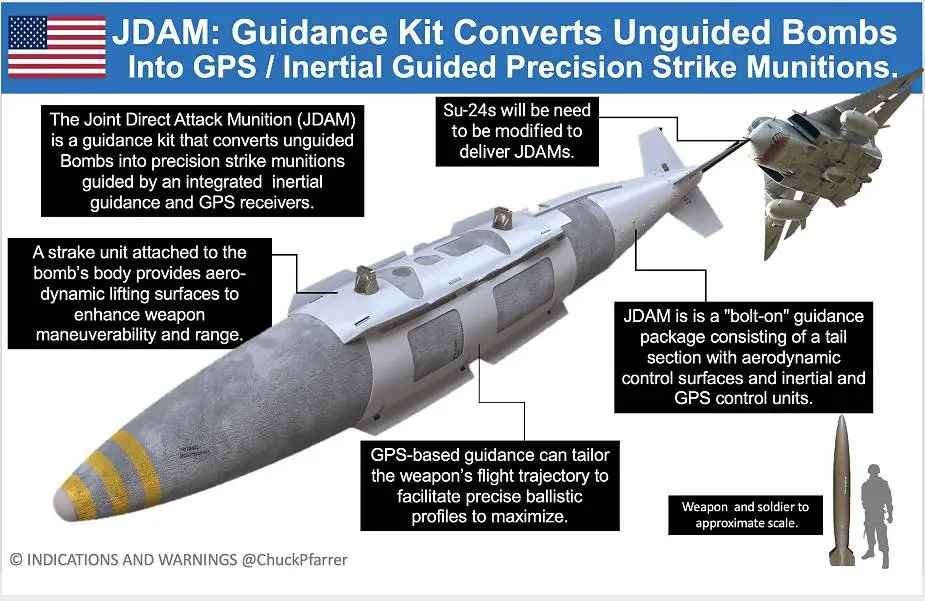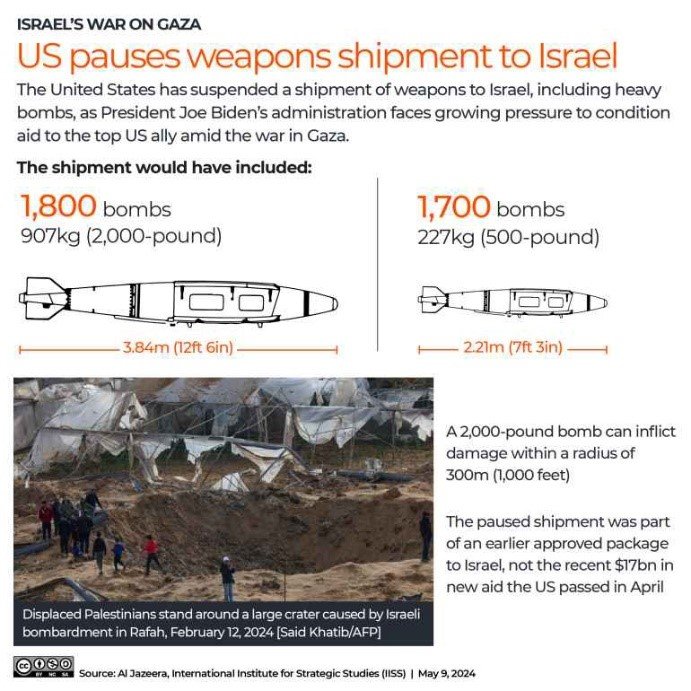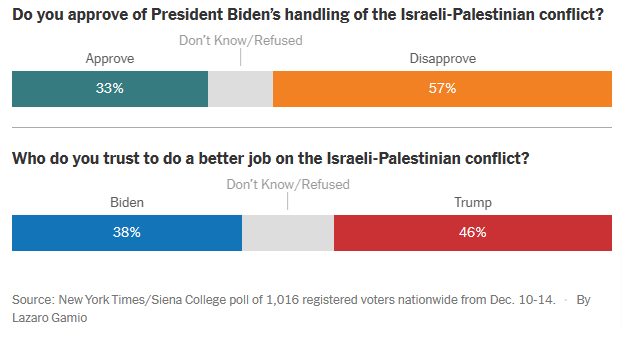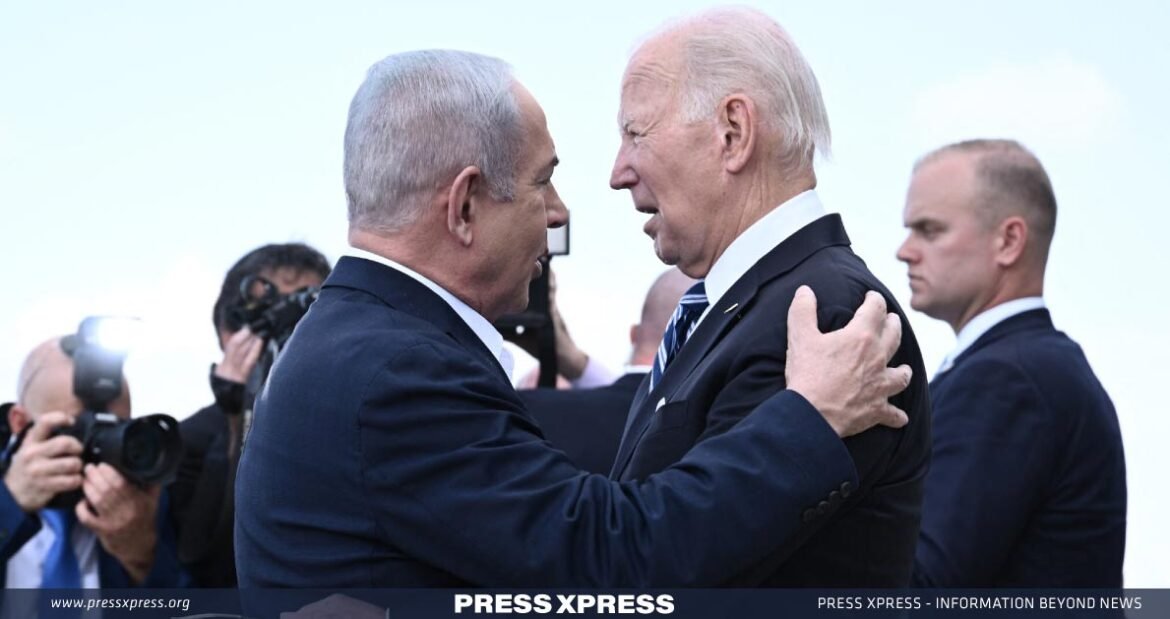The United States recently decided to halt a shipment of bombs to Israel, a move that highlights growing concerns over Israel’s plans for an assault on Rafah, a densely populated city in southern Gaza. This development underscores the tension and complexity of the relationship between the U.S. and its longtime ally amidst an escalating cycle of violence in the region.
You Can Also Read: PRESIDENT BIDEN NOMINATES NEW ENVOY TO BANGLADESH
The decision to pause the shipment is highly significant. Particularly if one considers the deep-rooted alliance and historic affinity that Israel and the US enjoy. Israel is not only one of the closest allies of the United States in the region, but arguably globally. The fact that the U.S. has decided to withhold shipments of military aid to Israel is arguably the strategic shock equivalent of ‘Hiroshima’ for Israel. Despite the suspension being a single ‘drop’ in what can be considered a torrent of continued aid for Israel from the U.S.


The decision by the United States to halt a shipment of bombs to Israel marks a significant development in the highly complex relationship between the two allies. This move comes amidst deep concerns over Israel’s proposed invasion of Rafah, a city in Gaza, and the ongoing conflict with Hamas.
The halted shipment highlights the tension and competing priorities at play. On one hand, the U.S. remains committed to supporting Israel’s security and is preparing additional arms deliveries, including precision-guided munitions, to help counter threats from Hamas. On the other hand, the prospect of an Israeli military operation in a densely populated area like Rafah raises serious humanitarian concerns.
U.S. Anti-Boycott Legislation and Israel
The United States has seen a notable surge in anti-boycott legislation, often in direct response to the growing Boycott, Divestment, and Sanctions (BDS) movement against Israel. This wave of legislation seeks to prevent individuals and organizations from participating in boycotts targeting Israel, a move that reflects the nation’s broader stance against the BDS movement.
One recent example of this legislative trend is the advancement of the IGO Anti-Boycott Act by the House Foreign Affairs Committee. This act seeks to expand existing laws to include boycotts initiated by international organizations, thereby strengthening the legal prohibition against participating in such actions. The bill’s passage with strong bipartisan support highlights the deep legislative commitment to Israel, even as public and international criticism of its policies in Gaza continues to mount.
At the state level, a vast majority of U.S. states have either already passed laws restricting the right to engage in boycotts against Israel or are currently in the process of doing so. Only a handful of states have yet to introduce such legislation.
These laws have ignited heated debates about their constitutionality and their potential chilling effect on free speech, with critics arguing that they represent a serious infringement on First Amendment rights.
The rise of these anti-boycott laws coincides with a growing wave of pro-Palestinian activism across the United States, particularly on college and university campuses. As tensions continue to escalate due to the ongoing conflict in Gaza, this activism has been met with a complex mix of institutional support and backlash, further complicating the already fraught discourse surrounding Israel and Palestine in the U.S.
In essence, the expansion of anti-boycott legislation in the United States is unfolding against a setting of increasing domestic and international tensions over Israel’s actions in Gaza. These developments raise powerful (and uncomfortable to U.S. administration) questions about the delicate balance between unwavering political support for Israel and the fundamental protection of free speech and civil liberties in the United States.
Continued U.S. Aid Despite Bomb Shipment Pause
Although the U.S. has temporarily halted specific bomb shipments to Israel due to worries about a potential invasion of Rafah, other aspects of military and financial support continue uninterrupted.
In recent months, the Biden administration has facilitated more than 100 separate arms sales to Israel, providing advanced munitions and crucial support equipment. This steady flow of aid is proof of the ongoing strength of U.S. military backing for its ally.
Moreover, the U.S. has pledged to transfer 25 state-of-the-art F-35 fighter jets to Israel, a move that emphasizes America’s long-term commitment to bolstering Israel’s defensive capabilities. This promise endures even as certain tactical decisions, like the bomb shipment pause, come under scrutiny and are adjusted in light of changing geopolitical and humanitarian considerations.
The continuation of aid, despite the bomb shipment pause, highlights the complicated and sometimes contradictory nature of the U.S.-Israel relationship. While the two nations remain deeply intertwined in terms of strategy and defense, there are moments when specific actions or decisions must be reassessed to account for broader concerns and responsibilities.
Possible Motivations Behind Shipment Suspension
President Biden’s administration has had to walk a tightrope since Israel invaded Gaza. It has repeatedly called for restraint and urged Israel to avoid civilian casualties while stating its steadfast support for Israel.
The Biden administration has urged Israel to develop a thorough plan to minimize civilian casualties before proceeding with any action in Rafah. This stance stems from increasingly intense and vehement criticism of Israel from within Biden’s own voting bank as well as his own party members; with many calling Israel’s actions as genocide.

A more ‘motivating’ factor may be the upcoming us presidential election. Biden has faced harsh criticisms from his own broad support base for his continued support of Israel. May inside the democratic party and American civilians consider Israel’s actions as genocidal and US aid and support as an act of complicity in this genocide.
With the Presidential elections knocking on the door, Biden can hardly afford any criticism, especially since polling shows that he’s becoming increasingly unpopular. This bid to halt aid might have more to do with ‘placating’ his voting base rather than any significant action. The Biden administration is essentially attempting to balance their voting bank while retaining the support of the Israeli lobby (arguably the most powerful ‘kingmakers’ in US politics).
Conclusion
The U.S.-Israel relationship is entering a complex new chapter, characterized by both enduring cooperation and emerging challenges. This partnership reflects the deep-rooted strategic bonds that have long united the two nations. However, recent tensions over Israel’s military strategies in Gaza, particularly U.S. concerns about civilian casualties, hint at a growing friction that could shape the future of this alliance.
The Biden administration finds itself at a crossroads, grappling with competing imperatives and trying to chart a course that upholds its values and responsibilities while also maintaining its long-standing commitment to Israel’s security. It’s a balancing act that requires the skill of a gymnast; the experience of a circus performer and a willingness to make tough choices in the face of complex geopolitical realities.
While it is unlikely that the US-Israel relationship will fracture, the US’s skittishness over civilian casualties and the public outcry from American citizens over Israeli atrocities will likely make both nations reconsider how they navigate the future of the alliance.


